Taipei Travel Guide
Hot, crowed and energetic, Taipei has grown from a swampy farming settlement into a modern metropolis in a blink. With a richness and depth of character seldom matched elsewhere, it offers travellers a unique sense of both the modern and the traditional.
Taipei is packed with incredible attractions, excellent restaurants and magnificent hotels. The city also gleams with glitzy shopping malls and wonderful museums. Temples, spas and peaceful gardens offer a nice change of pace.
Whether visitors are shooting through on business or holidaying, Taipei will not disappoint.
Things to do in Taipei
The soaring Taipei 101 Tower is the capital's greatest engineering feat and one of its best-loved sights. It's also the city's international financial centre. Another popular attraction is the National Palace Museum. Through its collection of ancient artefacts and artwork, it showcases some fascinating aspects of Chinese culture. For travellers interested in spirituality and religion, a visit to the Longshan Temple is a must.
As the sun goes down the night markets open up. They're usually packed with tourists and bargain-hunters who throng the alleyways in the heavy, humid night air. Taipei has many bars and nightclubs as well. If the city becomes too stifling, visitors can relax at one of the spas in the northwest, which utilise the Beitou area's hot springs. Hikers can enjoy the Yangmingshan National Park.
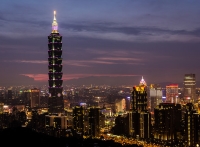
Taipei 101
Taipei 101 is the city's financial centre and was once the world's tallest building. Designed to resemble a gigantic bamboo stalk, it is Taipei's major landmark, with observation decks on the 88th and 89h floors. The building's lift takes a thrilling 40 seconds to get from ground level to the 89-th floor, where a spectacular view of the action-packed city awaits visitors. Decent restaurants and some of Taipei's swankiest malls make up the lower levels. It's also worth noting that the building incorporates the number eight, considered lucky in Chinese culture, through the eight sections of the outside building.
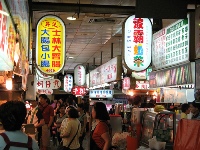
Shilin Night Market
Taipei's biggest and best night market is not just for shopping. Instead, it is a cultural experience that every visitor should enjoy. The action begins when the sun sets and thousands of stalls and stores open for business, selling everything from clothing to pets, souvenirs and DIY tools. It's wise to visit with an empty stomach, given the array of tempting treats on offer. Among many other things, visitors can try oyster omelettes, Shanghai-style fried buns, sticky tofu and Shilin big sausages.
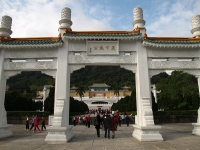
National Palace Museum
Taipei's National Palace Museum houses an astonishing collection of Ancient Chinese artefacts and artwork. Representing over 5000 years of Chinese history, it is the largest and perhaps finest collection of Chinese art in the world. The collection was once displayed in Beijing's Forbidden City and was moved to Taipei as a result of the Chinese Civil War. Visitors can view world-famous exhibits such as the 'Jade Cabbage' (a piece of jade carved to resemble a cabbage head), and a valuable copy of the Qingming Scroll.
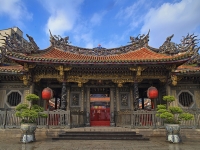
Longshan Temple
Longshan is one of the most popular temples in Taipei. Dedicated to the Buddhist Goddess of Mercy, Guanyin, it is an excellent example of the architecture commonly seen in Taiwan's older buildings. Chinese settlers built it in 1738 and its troubled history has seen it destroyed several times. To date, it has suffered damage by earthquakes, fires and even American bombers during World War II. Undaunted, Taipei residents have rebuilt it each time and it remains very much in use.
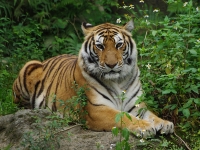
Taipei Zoo
Taipei Zoo is home to hundreds of animals, including local Taiwanese species such as the flying fox, Formosan black bear and Chinese pangolin. Arranged into different habitat sections that contain their native species, the zoo lets visitors see African savannah wildlife, tropical rainforest creatures and more in context. Visitors should set aside at least three hours to take everything in. The zoo has shifted its focus away from being a living museum and is running several conservation projects that span cities, counties and countries.
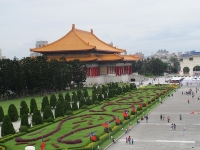
Chiang Kai-shek Memorial Park
Chiang Kai-shek Memorial Park is the pride of Taipei. Built in memory of the former Taiwanese President, the walled complex contains an impressive, pyramid-shaped monument to Chiang Kai-shek and is also home to the National Concert Hall and National Theatre. Everything stands inside a lovely park, which is fronted by a vast plaza where folk performances or other events often take place. The Memorial is the main venue for Taipei's famed Lantern Festival, Shangyuan, which draws thousands of lantern-carrying revellers to mark the Chinese New Year.
Getting Around
Public transport in Taipei relies on the MRT (Mass Rapid Transit) subway, and the city's vast bus network. The MRT covers most tourist spots and is generally the best option for transport. All MRT stations have ticket machines, with prices ranging from about TWD 20 to TWD 65, depending on the distance. Travellers can purchase day passes, while the rechargeable EasyCard is a good option for those spending more than a few days in the city.
The bus network is a bit confusing for foreigners and most get by without using it. Metered taxis are available, though drivers rarely understand English. Travellers should have destinations written down in Chinese if they plan on using taxis. Uber is also available.
Taipei Climate and Weather
Taipei has a humid subtropical climate. Summers are warm, sunny and humid, with average daytime highs reaching 90F (32C); winters are cool and mild, and temperatures drop to around 61F (16C). Due to Taipei's location, it is affected by the Pacific typhoon season, which occurs between June and October.
Taiwan travel info
Electricity
Electrical current is 110 volts, 60Hz. Two-pin, flat blade plugs are standard.
Language
Mandarin is the official language but many people speak Taiwanese (also called Hokkien). There are a growing number of English speakers.
Money
Taiwan's currency is the New Taiwan Dollar (TWD). Travellers will receive the best rates when exchanging money at banks, though not all banks will change money and many will only change US dollars. Anyone arriving with other currencies should use Mega Bank and the Bank of Taiwan at the airport. Rates are not as competitive at hotels and shopping malls. Major credit cards are accepted and ATMs are plentiful except in villages.
Tipping
Tipping isn't expected in Taiwan, though it is appreciated. Guests usually tip the porter at better hotels (100 TWD is considered courteous), and add 10 percent to their tour guide's fee if they're happy with the service.
Health
Taiwan's medical facilities can handle routine, emergency and outpatient treatment, with some centres also employing English-speaking staff. Travellers should have up-to-date vaccinations for hepatitis A, typhoid and Japanese encephalitis.
There has been an increase in cases of dengue fever, so travellers should pack insect repellent, especially if they're visiting the south of the island. Health insurance is recommended.
Safety
Most visits to Taiwan are trouble-free, with the only concerns being a low incidence of petty crime and natural hazards such as typhoons, tropical storms and earthquakes. The natural hazards are seldom severe.
Local customs
The concept of 'saving face' is very important on the island and tourists should try to avoid embarrassing locals. Self-control is another key point of etiquette, as the Taiwanese frown on outbursts and other public spectacles. It's impolite to have shoes on when entering someone's home or to make physical contact with strangers.
Doing business
Doing business in Taiwan is a pleasure for those who value a high work ethic and technologically savvy business partners. The island has traded heavily with the West for many years and business formalities have melded over time. However, it's important to observe and respect the cultural heritage many cling to.
Confucian values tend to dictate business etiquette in Taiwan, so locals generally appreciate gratitude, respect, mutual understanding and studiousness. Also, bar a few multi-nationals, most businesses in Taiwan are medium-sized and family-owned. In this context, the family's paternal head is always consulted, meaning business decisions can take longer.
Two important aspects of business culture in Taiwan are face and 'Guanxi' (relationships). Face relates to the dignity of a person or a company, and it informs all social and business interactions. It's important to save face at all times. For this reason, foreigners should not correct colleagues or expect them to correct themselves.
Gift giving and conducting deals slowly are key to operating in Taiwan. Generally, business people give a simple gift to all members involved in a meeting, and a better gift to the most important person. It's impolite to open gifts in front of hosts.
Foreigners should always accept invitations to events outside of normal business hours, as this is when locals build relationships. Business people consider it disrespectful to make direct or prolonged eye contact with someone who is in a very senior position, but will always direct conversation to the most senior person in the meeting.
The Taiwanese expect punctuality for meetings. Shaking hands is common for men and women nowadays, though a bow goes a long way as a sign of respect. Business hours are from 9am to 5.30pm, Monday to Friday. Business cards are exchanged often and should be printed in both English and Mandarin. Work clothes tend to be formal and conservative. Men wear dark suits, women wear modest dresses and skirts rather than pants. Mandarin is the language of business and hiring a translator is often necessary.
Duty free
Travellers aged over 20 may enter Taiwan without paying customs duty on 200 cigarettes or 25 cigars or 454g tobacco, 1 bottle of alcohol (maximum 1 litre), and a reasonable amount of perfume. Travellers are also permitted to bring personal goods valued up to NT$20,000 duty free (or NT$10,000 for those under 20 years). Guns, narcotics, fresh meat and fruit are prohibited.
Communications
Taiwan's international access code is +886. Travellers can purchase local SIMs for unlocked phones; WiFi is widely accessible in hotels, hostels, homestays, cafes, restaurants and some shopping malls.
Passport & Visa
Former China nationals who have resided outside of China for more than four years, and obtained the nationality of the country they reside in may enter Chinese Taipei according to the visa requirements of their acquired nationality. They will need to show documentation supporting the change in nationality.
It is highly recommended that travellers' passports have at least six months' validity remaining after the intended date of departure from their travel destination. Immigration officials often apply different rules to those stated by travel agents and official sources.
Entry requirements
US citizens must hold a passport valid for the period of intended stay. A visa is not required for stays of up to 90 days.
UK nationals require a passport that is valid for at least six months from their date of entry. A visa is not required for stays of up to 90 days.
Canadian nationals require a passport that is valid for at least six months beyond the date they expect to leave Taiwan. A visa is not required for stays of up to 90 days.
Australian nationals require a passport that is valid for at least six months from their date of entry. A visa is not required for stays of up to 90 days.
South African nationals require a visa for travel to Taiwan and a passport valid for six months after intended travel. Passengers with an ROC (Taiwan) Business and Academic Travel Card issued by Chinese Taipei are exempt for a maximum stay of 30 days.
Irish nationals require a visa and passport.
New Zealand nationals require a passport that is valid for at least six months from their date of entry. A visa is not required for stays of up to 90 days.
Useful contacts
Taiwan Tourist Office: +886 2 2349 1500 (Taipei) or eng.taiwan.net.tw
110 (Police), 119 (Ambulance and Fire)Embassies / consulates in other countries
Embassy of the Republic of China (Taiwan), Washington DC, United States: +1 202 895 1800.
Taipei Representative Office, London, United Kingdom: +44 20 7881 2650.
Taipei Economic and Cultural Office, Ottawa, Canada: +1 613 231 5080.
Taipei Economic and Cultural Office, Barton, ACT, Australia: +61 2 6120 2000.
Taipei Liaison Office, Pretoria, South Africa: +27 12 430 6071/2/3.
Taipei Representative Office, Dublin, Ireland: +353 1 678 5413.
Taipei Economic and Cultural Office, Auckland, New Zealand: +64 4 473 6474.
Embassies / consulates in Taiwan
American Institute in Taiwan, Taipei: +886 2 2162 2000.
British Office Taipei (formerly British Trade and Cultural Office), Taiwan: +886 2 8758 2088.
Canadian Trade Office, Taipei: +886 2 8723 3000.
The Australian Office in Taipei: +886 2 8725 4100.
Liaison Office of South Africa, Taipei: +886 2 2715 2295.
Office closed in 2012.
New Zealand Commerce and Industry Office, Taipei: +886 2 272 05228. After hours emergency assistance for New Zealanders Phone: +886 934 404 594.



